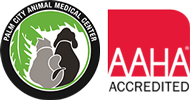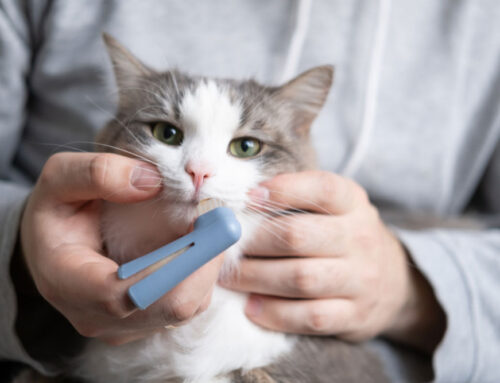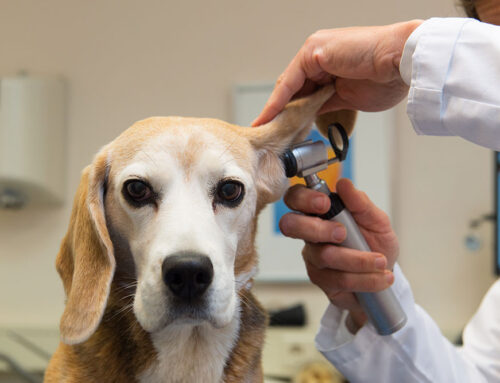Pets can be mischievous creatures, and some have a talent for getting into trouble. The ASPCA Animal Poison Control Center (APCC) receives hundreds of thousands of calls each year from veterinarians and pet owners looking for help managing pet poisonings. Many common household items can be toxic to pets, and you may be surprised how many are lurking in your own home. To avoid pet poisonings, you need to recognize the harmful items, so Palm City Animal Medical Center lists the most common pet toxins.
#1: Medication toxicities in pets
Some medications that are safe for people may be toxic to pets, including those you can buy from the pharmacy shelves, or those that require a prescription. Toxic effects vary, depending on the medication and dose ingested.
- Over-the-counter medications — Aspirin, ibuprofen, and acetaminophen are examples of over-the-counter anti-inflammatory medications that may cause stomach ulcers, kidney disease, or liver damage in pets. Cold medications, vitamins, herbal supplements, and skin creams can also cause toxicity.
- Prescription medications — ADHD, heart, anti-anxiety, and antidepressant medications are some of the most commonly ingested prescriptions that cause toxicity.
- Veterinary medications — In school, your veterinarian learned the useful adage that “all drugs are poisons.” Simply put, this means that safe medications prescribed for your pet can become unsafe if consumed in large quantities, as sometimes occurs with flavored, chewable medications. Other medications may be safe for one species, but not for another, such as some canine flea and tick products that cause neurological problems when applied to cats.
#2: Foods toxicities in pets
- Chocolate, coffee, and caffeine — Methylxanthines are compounds present in these products that cause toxicity in pets. Severity depends on the amount ingested, with effects ranging from mild stomach upset to hyperactivity, tremors, seizures, and death. The amount of methylxanthines varies according to chocolate darkness, with white chocolate being fairly innocuous and baker’s chocolate and cocoa powder the most dangerous.
- Xylitol — This artificial sweetener is present in some baked goods, gum, mints, and toothpaste. A small amount can cause a dramatic drop in blood sugar, and lead to incoordination, vomiting, and seizures, followed by liver failure.
- Grapes and raisins — The toxin in grapes and raisins hasn’t been identified, but eating only a few may cause kidney failure in some dogs.
- Onions and garlic — Onions, garlic, and chives can cause stomach upset or anemia, if consumed in large enough quantities, because of red blood cell damage.
- Alcohol and raw yeast dough — Alcohol can cause intoxication, vomiting, depression, coma, or death. Raw bread dough containing yeast can ferment in the stomach, creating gas and ethanol as byproducts. The gas can cause stomach bloating or twisting—an emergency situation—and the ethanol acts the same as ingested alcohol.
- Macadamia nuts — Ingestion causes depression, vomiting, tremors, and elevated body temperature in dogs.
#3: Rodenticide toxicity in pets
Mouse and rat poisons pose a grave threat to pets. In the past, most rodenticides were made with anticoagulants, a poison that prevents blood clotting and is treated with an oral antidote. In recent years, newer generation poisons have made anti-coagulants less accessible, and now most rat poisons contain other ingredients, such as cholecalciferol—vitamin D, or bromethalin, both of which are more difficult to treat. Vitamin D poisoning causes increased calcium in the blood, leading to acute kidney failure. Bromethalin leads to brain swelling and subsequent seizures, coma, and death.
#4: Plants toxicities in pets
The list of toxic plants is long, but the reality is that most plants are non-toxic or cause only mild gastrointestinal upset. However, some plants, including autumn crocus, azalea, cyclamen, kalanchoe, oleander, dieffenbachia, lily of the valley, daffodils, sago palm, tulips, and hyacinths, can cause more severe illness, or death, in pets. True lilies may be the most common offenders, as all parts are highly toxic to cats, and can cause rapid kidney failure with ingestion of only one flower petal. For a full list of toxic plants and their effects, see the ASPCA’s list of toxic and non-toxic plants.
#5: Household and garden product toxicities in pets
- Antifreeze — Antifreeze contains ethylene glycol and causes severe, acute kidney failure and rapid death, if untreated.
- Cigarettes, e-liquid, and nicotine patches — Nicotine causes vomiting, depression, changes in heart rate and blood pressure, seizures, and respiratory failure. E-liquid is highly concentrated and particularly dangerous.
- Fertilizer and lawn chemicals — Fertilizers can be irresistible to pets because of animal-based ingredients, but they also contain minerals and chemicals that can be toxic in concentrated amounts.
- Mycotoxins — Composted or rotting food can grow mold capable of producing mycotoxins, some of which may cause illness in your pet.
What to do if your pet ingests a toxin

If you believe your pet has ingested a toxic substance, or you’re unsure, call your veterinarian for advice right away. You can also contact your local emergency veterinarian, the ASPCA Animal Poison Control Center, or the Pet Poison Helpline. Toxic substances can cause damage quickly, so the faster you take action, the better your pet’s chances of a good outcome. Treatment for toxin ingestion may include emesis induction (i.e., vomiting), administration of activated charcoal for decontamination, hospitalization with IV fluids, antidotes for specific toxins, and various medications for supportive care.
How to prevent common pet poisonings
The best way to keep your pet safe from toxins is to keep them out of reach. Keep medications, household chemicals, and nicotine products in secured cabinets. Don’t leave toxic foods like chocolate or raw bread dough out on countertops unattended, whether or not you think your pet can’t reach them. Keep purses and bags out of your pet’s reach, too. Outdoors, avoid toxic plants in your yard, and keep your pet on a leash in an unfamiliar environment. If you have a cat, bringing lilies into your home is not worth the risk. If you have a rodent problem, avoid rodenticides, and use other methods whenever possible.
If you’re concerned about potential toxins in your home, or you believe your pet has ingested a toxin, call us immediately so your Palm City Animal Medical Center team can advise you on the best course of action.








Leave A Comment